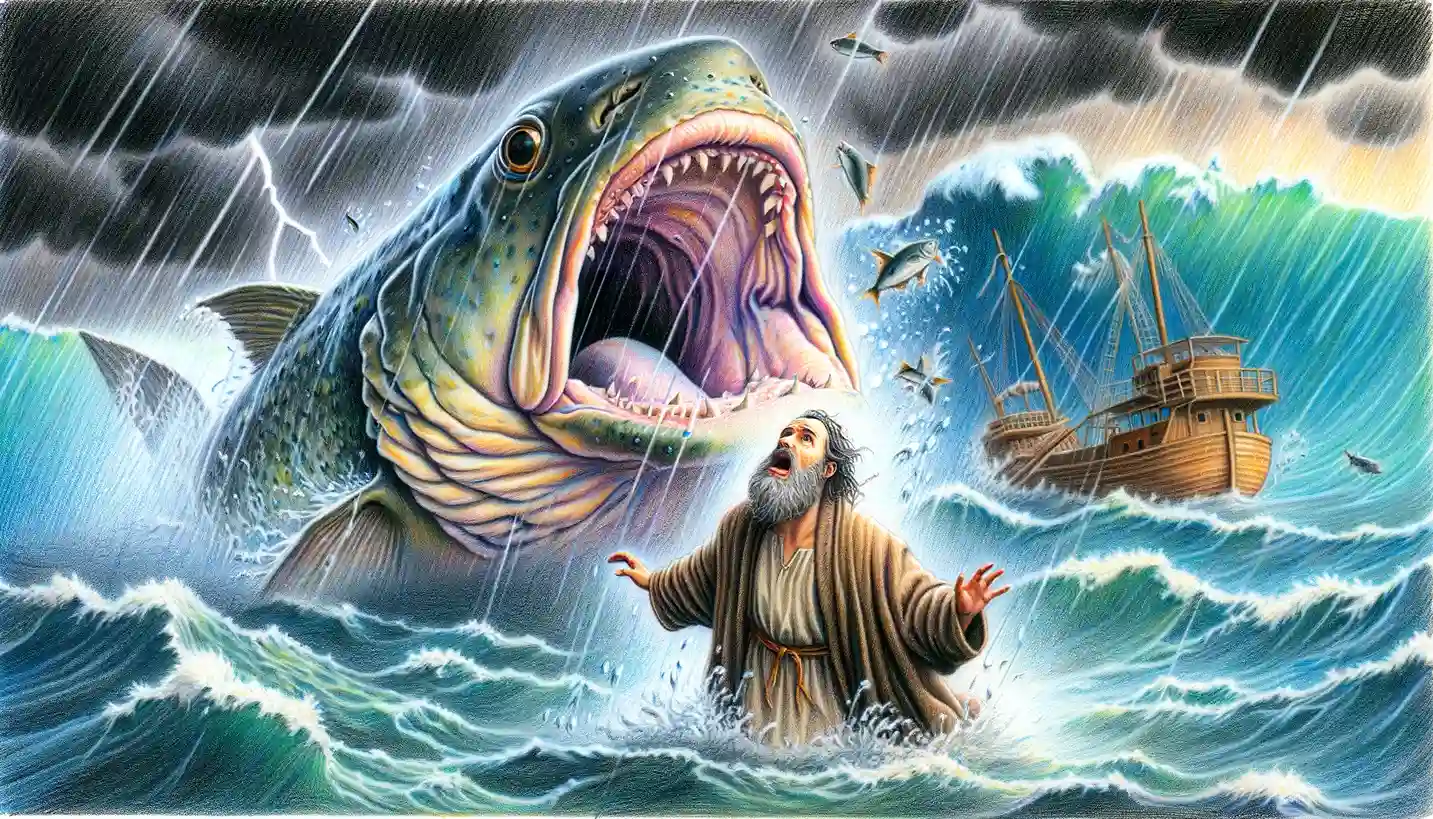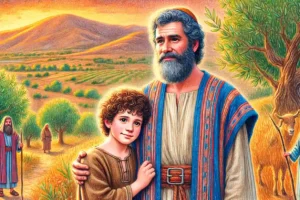
Jonah: Prophet who was Swallowed by a Great Fish
Jonah, a prophet in the Hebrew Bible, is best known for being swallowed by a great fish after attempting to flee from God’s command to prophesy to the city of Nineveh. His story highlights themes of divine mercy, repentance, and obedience.
Quick Facts
- Prophetic Mission: Jonah was commanded by God to go to Nineveh and preach against its wickedness.
- Flight to Tarshish: Instead of obeying, Jonah fled in the opposite direction, boarding a ship to Tarshish.
- Storm and Sacrifice: A great storm threatened the ship, leading the sailors to throw Jonah overboard to calm the sea.
- Swallowed by a Fish: Jonah was swallowed by a great fish, where he spent three days and three nights.
- Repentance and Deliverance: Inside the fish, Jonah prayed to God, who commanded the fish to vomit him onto dry land.
- Preaching in Nineveh: Jonah went to Nineveh and preached, leading the entire city to repent.
- God’s Mercy: God spared Nineveh, highlighting His mercy and willingness to forgive.
Historical and Cultural Context
Jonah’s story is set during the reign of Jeroboam II in the 8th century B.C. (2 Kings 14:25). This period was marked by relative prosperity in Israel, but also by social and religious decay. Nineveh, the capital of the Assyrian Empire, was known for its brutality and wickedness, making Jonah’s mission particularly daunting.
Call and Flight
God’s command to Jonah was clear: go to Nineveh and preach against its wickedness (Jonah 1:2). However, Jonah chose to flee to Tarshish, a distant location often identified with a place in Spain, to escape God’s presence (Jonah 1:3). His flight represents a profound act of disobedience and an attempt to evade divine responsibility.
The Storm and the Great Fish
As Jonah sailed to Tarshish, God sent a violent storm that threatened to break the ship apart (Jonah 1:4). The sailors, realizing the storm was supernatural, cast lots and identified Jonah as the cause. Jonah admitted his flight from God and suggested they throw him overboard to calm the sea (Jonah 1:12). Reluctantly, they complied, and the sea immediately calmed, leading the sailors to worship God (Jonah 1:15-16).
Jonah was then swallowed by a great fish, often depicted as a whale, where he spent three days and three nights (Jonah 1:17). This period in the fish symbolizes a form of death and resurrection, foreshadowing Christ’s own death and resurrection (Matthew 12:40).
Prayer and Deliverance
Inside the fish, Jonah prayed a heartfelt prayer of repentance and thanksgiving (Jonah 2). His prayer, recorded in poetic form, reflects a deep acknowledgment of God’s sovereignty and mercy. God commanded the fish to vomit Jonah onto dry land, giving him a second chance to fulfill his mission (Jonah 2:10).
Mission to Nineveh
This time, Jonah obeyed and went to Nineveh, a vast city that required three days to traverse (Jonah 3:3). His message was simple: “Forty more days and Nineveh will be overthrown” (Jonah 3:4). The people of Nineveh, from the king to the commoners, believed Jonah’s message, fasted, wore sackcloth, and repented of their evil ways (Jonah 3:5-9).
God’s Mercy
God saw their repentance and relented from sending the destruction He had threatened (Jonah 3:10). This act of divine mercy highlights God’s readiness to forgive those who genuinely repent, regardless of their past sins or status as outsiders to Israel.
Jonah’s Anger and God’s Lesson
Despite Nineveh’s repentance, Jonah was displeased and angry with God’s mercy (Jonah 4:1). He retreated to a place east of the city to see what would happen. God provided a leafy plant to give Jonah shade, but then sent a worm to wither it, and a scorching wind to discomfort Jonah (Jonah 4:6-8). Through this, God taught Jonah a lesson about compassion, emphasizing His concern for the people of Nineveh and even the animals within the city (Jonah 4:10-11).
Theological Themes
Jonah’s story explores several important theological themes:
- Divine Sovereignty: God’s control over nature and events is evident throughout the story, from the storm to the fish to the plant.
- Repentance and Mercy: The narrative underscores the power of repentance and God’s willingness to show mercy to all, including Gentiles.
- Obedience: Jonah’s initial disobedience and subsequent compliance highlight the importance of obeying God’s commands.
- God’s Universal Concern: The story illustrates God’s concern for all humanity, not just Israel, emphasizing His desire for repentance and salvation for all nations.
Legacy and Impact
The Book of Jonah has had a lasting impact on both Jewish and Christian traditions. It is read during Yom Kippur in Jewish liturgy, symbolizing repentance and forgiveness. In Christian tradition, Jesus refers to Jonah’s three days in the fish as a sign of His own death and resurrection (Matthew 12:40). Jonah’s story continues to be a powerful narrative about God’s mercy, human repentance, and the importance of following divine directives.
Conclusion
Jonah’s experience of fleeing from God’s command, being swallowed by a great fish, and ultimately leading Nineveh to repentance serves as a profound lesson in obedience, divine mercy, and the power of repentance. His story remains a significant and enduring part of biblical literature and theology.



